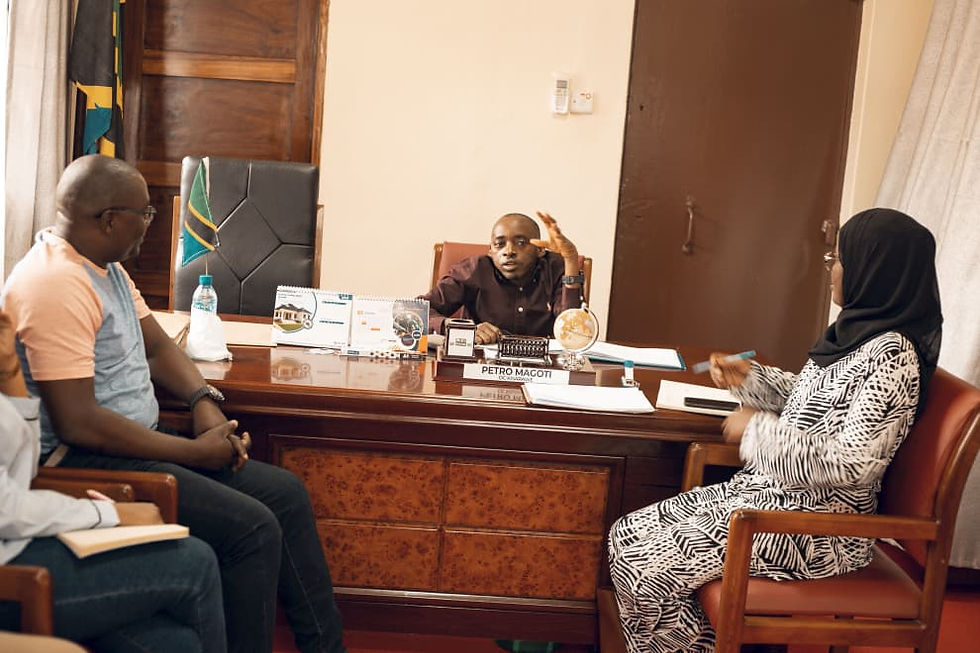Empowering Youth Through Digital SRHR Tools.
- C-Sema Team
- Mar 28, 2025
- 3 min read
At C-Sema, we know that real change starts at the community level often with young people at the center. This March, under the 2gether 4 SRHR program and with the incredible support of UNFPA, we joined hands with our partners VIAMO and KIWOHEDE to make that belief real for 100 peer educators in Kigoma Municipal Council and Kasulu Town Council.

The mission? Equip young people with the knowledge, digital tools, and confidence to promote youth-friendly Sexual and Reproductive Health and Rights (SRHR) services in their communities.
Over three action-packed days, we saw stories unfold of discovery, advocacy, laughter, learning, and vision-building. And now, we’re excited to share that story with you.
Before the trainings began, our team visited key government offices to introduce the initiative and secure support. The response was overwhelmingly positive.
“We need more efforts like this to ensure young people get the right SRHR information, especially now, this initiative is definitely coming at the right time.” said Mr. Damas Kaiyela, Regional Medical Officer in Kigoma MC.
With pledges of collaboration from Regional and District Social Welfare Officers, the stage was set for a meaningful engagement with young changemakers.
We began with 50 young, eager peer educators, 29 men and 21 women, including individuals with disabilities. After a baseline evaluation (which revealed that only 53% were aware of the 116 National Child Helpline), we dove right in.

A peer educator filling in the pre-evaluation survey.
Ms. Faith Mkony, our Communications and Advocacy Lead, introduced the 116 National Child Helpline and what it offers on the SRHR front. i.e., confidential support for GBV, early pregnancies, and HIV/AIDS, parental guidance and youth-friendly SRHR education, as well as real-time referrals for urgent and long-term care
“This helpline exists for you , and for the young people you’ll be supporting. Help them find their voice and their support system,” she urged.
The session was followed by interactive role-play where peer educators practiced how to guide a peer in crisis to call 116.

Ms. Faith Mkony during the roll-playing exercise.
Then came the tech piece. Mr. Willhard Banta from VIAMO introduced the Elimika Digital Platform, a mobile-based learning hub delivering SRHR content straight to young people’s phones. Through live demos and group activities, educators explored learning modules on SRHR topics, interactive quizzes and direct connections to service providers. Apart from learning about the platform, the peer educators also brainstormed how to introduce it in schools, youth clubs, and WhatsApp groups.

Mr. Bantanuka during his session.
KIWOHEDE's facilitator, Ms. Theodesia, closed the day with a powerful session on youth advocacy.
“You are not just learners here, you are leaders in your own capacities. Use your voice to break stigma, start conversations, and advocate for services that work for young people like yourselves.”
Before the day ended, the educators formed small groups to draft 2025 action plans focused on school-based SRHR education, community sensitization through outreach and digital awareness campaigns using platforms like Elimika. Each group received printed A1 posters on the 116 Helpline and Elimika, tailored for distribution in their own wards.
In Kasulu.
Here, we met a new cohort of 23 men, 27 women, and 5 young people with disabilities and we quickly felt the same passion. The day followed a similar structure, beginning with support from Dr. Peter Janga, RMO for Kasulu before the team headed to the venue.
C-Sema again facilitated sessions on the 116 Helpline, reinforcing how peer educators can act as a lifeline for their peers. Then VIAMO and KIWOHEDE carried the momentum forward with platform training and youth advocacy workshops. By the end of the session, every educator committed to reaching at least 240 young people monthly in 2025, with monitoring support from KIWOHEDE.

Peers presenting their 2025 action plan.
The final day was focused and intentional. We brought together 10 selected peer educators for a pre-testing session of the Elimika platform.
Their job was to tell us what was working and what needs to improve. Their feedback was smart, clear, and exactly what we needed. This input will directly inform the next phase of Elimika’s development, ensuring the platform is as relatable and relevant as it is informative.

Peer educators during the Pre-Testing of the Elimika Digital Platform Content session.
We remain committed to amplifying young voices, building safer communities, and ensuring that every child and youth in Tanzania has access to trusted SRHR information and services.
Prepared by C-Sema's Communication Team.



